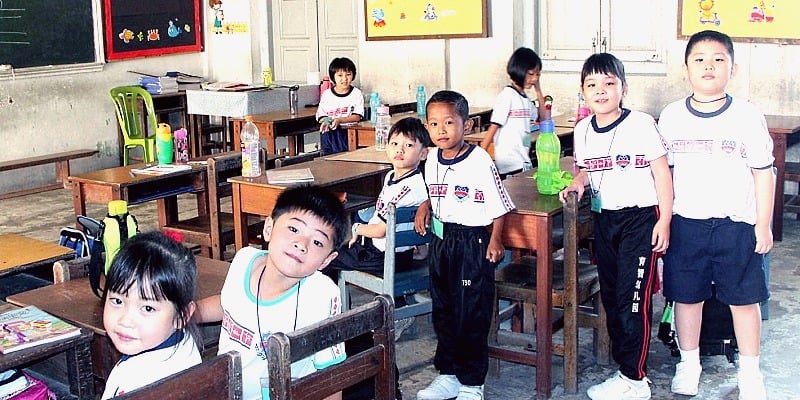With such a gap already very obvious today, keeping the multi-grade system will only tear it further apart and become the last straw that breaks the camel’s back where rural primary school education is concerned.
The education ministry announced on its official website that micro primary schools with fewer than 30 students would continue with the multi-grade system until 2025.
There are as many as 432 “ultra micro schools” nationwide affected by this policy, or about 5.61% of all 7,698 primary schools in the country. Of this total, 97 are Chinese primary schools, or about 7.47% of all SJKCs in the country.
The multi-grade or combined classroom policy is applicable to all micro primary schools nationwide, irrespective of whether they are national schools, Chinese or Tamil primary schools, as long as the number of students at each of these schools is lower than 30.
In such schools, students in Years 2, 3, 4 and 5 will have to attend the class together within the same classroom, while those in Years 1 and 6 will not be affected.
While the policy looks fair as it is implemented at all schools with fewer than 30 students irrespective of race, the phenomenon nevertheless reflects the vast disparity between urban and rural schools as well as protrudes the issue of educational inequality.
Earlier this week, we published an editorial highlighting the importance of closing the urban-rural gap especially in education and healthcare, as the utmost priority of the unity government. Unfortunately, the unity government has decided to keep the multi-grade system for micro schools not just for one year but three years!
Both Dong Zong and Jiao Zong have concurred that education should not be overridden by economic considerations and the students’ right to education must never be compromised.
Indeed, the education ministry should map out a better policy to substitute the existing multi-grade policy through consultation with the interested parties and seriously contemplate on the planning for the micro schools’ curriculum as well as the availability of qualified teachers and their future development. Major decisions must not be made rashly, especially when it comes to educating our young.
So, is there any problem instituting the multi-grade policy merely because there are not enough students to justify separate classes for different grades of students?
Sure enough there is!

As Jiao Zong president Cheah Lek Aee has said, if students from different grades were to be put within the same classroom, the time dedicated to each grade of students will invariably be halved, and this will not do the students nor the teachers any good.
If the ministry fails to come up with a better solution, parents will hesitate whether to send their children to borderline schools which may likely fall into the category of micro schools soon. The result, we will have more and more of these ultra micro schools in our country, particularly in rural areas.
No doubt, Anwar Ibrahim’s unity government has placed a whole lot of emphasis on the education for our young, and therefore passed the “mini budget” in which the education ministry has been allocated RM25 billion, or 23.2% of the total amount set aside for the mini budget.
The aforementioned 432 ultra micro schools have a collective enrollment of under 10,000. If the multi-grade policy is to be substituted with normal separate classes, we will need at most an addition of 864 teachers (as a matter of fact, most of these ultra micro schools have an adequate supply of teachers and infrastructure) involving under RM20 million in the ministry’s annual payroll budget, although this is going to benefit close to 10,000 students.
Doing away with the multi-grade system will accord primary schools students in rural areas more equitable access to education opportunities in order to arrest any further widening of the urban-rural gap in education.
With such a gap already very obvious today, keeping the multi-grade system will only tear it further apart and become the last straw that breaks the camel’s back where rural primary school education is concerned.
Could that be the problem of the people in charge at the education ministry? Minister Fadhlina Sidek is a lawyer by training, having graduated with a law degree at IIUM and specializing in Islamic family laws but hardly any background in education.
Her deputy Lim Hui Ying is a Universiti Malaya Bachelor of Art holder, also without any educational background. Both Fadhlina and Lim are first-time MPs to start with!
Hastily put in office, sure enough these two ladies might not be familiar with running the education ministry and will therefore very likely take the advice of the education director-general. And the safest way of doing things is to keep them as they are!
We are not here to question the competency and ability of the minister and deputy minister, but education is the primary national undertaking that will usher the country into continued prosperity.
A successful education system will create top-rated talents in various fields and will immensely expand the country’s wealth. The exemplary accomplishment of our tiny neighbor down south Singapore can be wholly attributed to its rich human assets.
As such, lifting the country’s education quality and instituting the necessary reforms is of paramount importance to the country’s continued prosperity and we cannot afford to let Fadhlina and Lim take their sweet time learning from the mistakes!
Closing the urban-rural gap in education, reviewing the multi-grade system in micro schools, providing nutritious lunch for primary school students, addressing the issue of commutation for students living in remote villages, recognition of the UEC certificate… The two ladies might not be well versed with all these long-standing issues in education, but at least they can take heed of the feedback and views of the public.
It is hoped that the minister and her deputy will always bear in mind the objectives of the Malaysian education ministry: to inculcate patriotism and solidarity among Malaysians; to groom knowledgeable, competent, trustworthy and ethical talents; to train capable human resources to meet the country’s development needs; and to provide equitable educational opportunities to all Malaysians.
These are all the education ministry’s guiding principles which must be committed to memory at all times and be executed conscientiously.
ADVERTISEMENT
ADVERTISEMENT








































